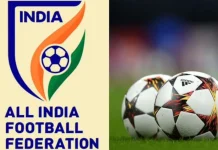India’s football administration entered a critical phase in August 2025 after FIFA and the Asian Football Confederation (AFC) issued a firm ultimatum to the All India Football Federation (AIFF).
The two organizations insisted on the AIFF to accept a new version of the constitution by October 30, 2025, which is fully in line with international statutes. Failure to do so, India faces the likelihood of being suspended in action in the international tournaments and being barred in voting issues and also a potential freeze in development funds.
The letter made it clear that the so much delay in the finalization of roles and responsibilities of the constitution has paralyzed the credibility of the federation. In particular, FIFA specifically pointed to disruption of domestic schedules, uncertainty to clubs, and instability of commercial obligations as a failure of governance. The international reaction has re-introduced a sense of urgency into a process which has stalled since 2017, and which served to remind stakeholders that institutional compliance is non-negotiable under international standards of governance.
Judicial Limbo And Its Structural Consequences
At the center of AIFF’s paralysis lies a long-standing judicial process. Since 2017, India’s Supreme Court has held supervisory authority over the AIFF’s constitution revision following legal challenges and public interest litigation. The complexity grew after India’s Ministry of Youth Affairs and Sports passed the National Sports Development Act (NSDA) in 2024, requiring federations to align governance frameworks with the revised national sports code.
While reports suggest a draft verdict is ready, the apex court has opted for procedural caution. It has delayed the ruling to consider how NSDA’s provisions affect both the content and application of AIFF’s future constitution. This legal bottleneck, although intended to ensure constitutional clarity, has frozen AIFF’s ability to finalize electoral structures, appoint independent ethics bodies, and enforce transparent dispute resolution.
Administrative Fallout And Economic Ripple Effects
This legal vacuum has disrupted AIFF’s ability to function as a professional, commercially reliable organization. Indian Super League (ISL) clubs have expressed frustration at scheduling delays and the absence of guidance on squad registration and foreign player quotas. Sponsors and broadcasting partners are reportedly renegotiating terms, citing force majeure clauses due to AIFF’s administrative failure.
The situation is also affecting player contracts. FIFPRO, the global union representing professional footballers, has noted a spike in cases of contract terminations and wage defaults. The uncertainty around league start dates, especially for ISL and I-League players, has jeopardized job security and exposed the vulnerabilities of India’s underdeveloped player protection framework.
Stalled Ambitions And International Consequences
India’s aspirations on the international football stage now hang in the balance. FIFA’s threat of suspension would prevent Indian teams from competing in qualifiers for events like the AFC Asian Cup and youth-level championships. More immediately, such a suspension would prevent India from participating in the FIFA Talent Development Scheme and future joint bid talks for tournaments like the U-20 World Cup or even the Olympic qualifiers.
The warning also places pressure on India’s larger sporting ambitions. Ahmedabad’s bid for the 2036 Olympic Games includes proposed upgrades to football infrastructure as a key pillar. A suspension from FIFA would be seen by the International Olympic Committee as a major governance shortfall, potentially weakening India’s positioning in the bidding process.
Commercial Setbacks And Grassroots Development
AIFF’s governance inertia threatens its funding lifeline. Corporate partners have already scaled back support for youth academies and regional training centers amid uncertainty about the long-term viability of the federation’s leadership. Moreover, a freeze in FIFA Forward or AFC technical assistance programs could halt grassroots development in states like Manipur, Kerala, and Mizoram—regions which have supplied most national team players in recent years.
FIFA’s letter emphasized that federations must ensure a “consistent domestic competition pathway” for youth, amateur, and professional levels. AIFF’s current inability to roll out such a program for the 2025–2026 cycle weakens India’s talent pipeline just as youth scouting programs in Europe and West Asia are showing interest in Indian players.
Independence, Interference, And Accountability
FIFA and AFC statutes are explicit: member federations must operate free of external influence, particularly from governments or courts. India’s case is unusual because judicial intervention originated from concerns over corruption and nepotism within AIFF’s old guard. However, the prolonged nature of the court’s involvement now risks undermining that very independence.
The global football bodies have made it clear that judicial timelines cannot become indefinite. The expectation is not the exclusion of courts from oversight, but a time-bound adjudication that allows the federation to implement reform without micromanagement. India’s challenge, then, is to exit this impasse with a model that satisfies legal scrutiny without violating FIFA’s non-interference clause.
Shifting The Governance Culture Within AIFF
Reforming the AIFF is not merely a procedural task; it involves shifting an entrenched governance culture. For years, the federation has operated through opaque electoral systems, overcentralized decision-making, and resistance to stakeholder input. The new constitution must introduce fixed term limits, enforce conflict-of-interest rules, and empower independent commissions to handle ethics, arbitration, and anti-doping issues.
Analysts argue that India’s governance transition must be inclusive. Any new draft should involve active input from state associations, players’ unions, women’s football representatives, and futsal stakeholders. The failure to reflect the diversity of India’s footballing ecosystem risks creating another round of legal and institutional backlash.
Shaping The Path Ahead
The coming months will define the AIFF’s trajectory for years to come. A Supreme Court verdict, expected by mid-September 2025, may offer legal clarity. But it will fall on AIFF’s General Assembly to adopt the revised constitution and elect new office bearers in accordance with international norms. The deadline, October 30, is not merely a question of compliance- but also a question of the administrative will of India.
Success by the federation in meeting this challenge will be an indication that Indian football is ready to open up to transparency, planning and the democratic process of governance. In addition, it is a good chance of restoring confidence among players, clubs, fans and investors.
The football fraternity of India is in a crucial juncture. The changes required are not limited to the wording of the constitution- they must be changes to how the institutions operate and who they serve. How India responds to this clarion call with conviction or shilly-shallying will not only define not only the story of this federation but also how the rest of the emerging states can find a place in the international sporting rulebook. The decisions taken at the moment may define the future of India in the world of football, a peripheral member or a change maker.










